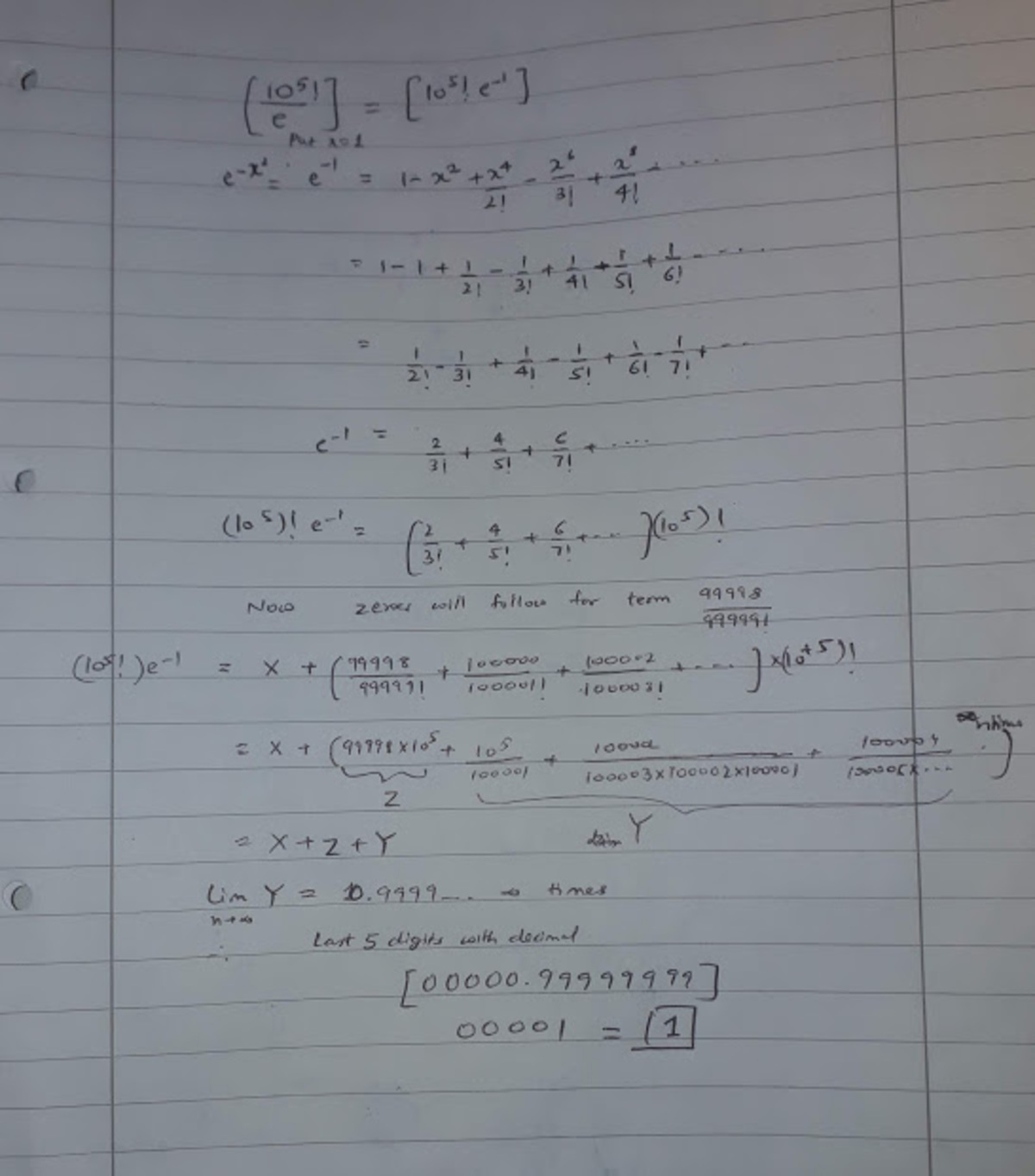Dividing by e
Let [ x ] denote the closest integer to x , for example [ 4 . 7 ] = 5 and [ 9 . 1 ] = 9 .
Find the last 5 digits of [ e 1 0 0 0 0 0 ! ] .
( e is Euler's constant and ! is the factorial function.)
(If the answer begins with one or more zeroes, you don't need to write them, for example if you got 01234 as an answer then you can just write 1234)
The answer is 1.
This section requires Javascript.
You are seeing this because something didn't load right. We suggest you, (a) try
refreshing the page, (b) enabling javascript if it is disabled on your browser and,
finally, (c)
loading the
non-javascript version of this page
. We're sorry about the hassle.
3 solutions
Thank you, i had the same solution but I couldn't explain it very well :/
You need to deal with the whole infinite tail of the series, and not just the next term. Since it is an alternating series, however, we can say that ∣ ∣ ∣ ∣ ∣ n = 1 0 0 0 0 1 ∑ ∞ n ! ( − 1 ) n × 1 0 0 0 0 0 ! ∣ ∣ ∣ ∣ ∣ < 1 0 0 0 0 1 1 < 2 1 and we are done.
Log in to reply
You're right! I edited my solution. Thanks!
Log in to reply
Actually, the error term n = 1 0 0 0 0 1 ∑ ∞ n ! ( − 1 ) n × 1 0 0 0 0 0 ! has negative first term, so lies strictly between − 1 0 0 0 0 1 1 and 0 . Thus the last five digits of the integer part, and the first five digits of its fractional part, of e 1 0 0 0 0 0 ! are 0 0 0 0 0 . 9 9 9 9 9 , but that makes the last five digits of the integer closest to this number 0 0 0 0 1 . On the other hand, the last five digits of the integer part of e 1 0 0 0 0 0 ! are 0 0 0 0 0 .
Log in to reply
@Mark Hennings – I edited my solution. Thanks again!
e 1 = 1 − 1 + 2 ! 1 − 3 ! 1 + . . . . . + ( − 1 ) n n ! 1 + . . . .
So, e n ! = 2 ! n ! − 3 ! n ! + . . . . + ( − 1 ) n − 1 n + ( − 1 ) n 1 + X
For, n = 1 0 0 0 0 0 we can easily see − 0 . 5 < < X < < 0 . 5 .
So, [ e 1 0 0 0 0 0 ! ]= A ( say)= 2 ! n ! − 3 ! n ! + . . . . + ( − 1 ) n − 1 n + ( − 1 ) n 1 .
Now, we are asked to find last five digits of A . So, we have to mind
A ( n = 1 0 5 ) modulo(100000) or [ e n ! ]modulo(n).
And obviously, all terms except the last term in A ( − 1 ) n are divisible by n . Hence, A modulo n = ( − 1 ) n .
As, n = 1 0 0 0 0 0 , ( − 1 ) n = 1 . Hence the last five terms of the expression is 0 0 0 0 1 = 1

By the Taylor Series expansion, e x = 1 + x + 2 ! x 2 + 3 ! x 3 + 4 ! x 4 + 5 ! x 5 . . .
Therefore, e 1 0 0 0 0 0 ! = 1 0 0 0 0 0 ! e − 1 = 1 0 0 0 0 0 ! ⋅ 1 − 1 0 0 0 0 0 ! ⋅ 1 + 1 0 0 0 0 0 ! ⋅ 2 ! 1 − 1 0 0 0 0 0 ! ⋅ 3 ! 1 + 1 0 0 0 0 0 ! ⋅ 4 ! 1 − 1 0 0 0 0 0 ! ⋅ 5 ! 1 . . .
Since ∣ 1 0 0 0 0 0 ! ⋅ 9 9 9 9 9 ! 1 ∣ > 9 9 9 9 9 and 1 0 0 0 0 0 ! ⋅ ∣ n = 1 0 0 0 0 1 ∑ ∞ n ! ( − 1 ) n ∣ < 2 1 , the only term that affects the last five digits of [ e 1 0 0 0 0 0 ! ] is 1 0 0 0 0 0 ! ⋅ 1 0 0 0 0 0 ! 1 = 1 , so the last five digits round up to 0 0 0 0 1 , which makes the answer 1 .